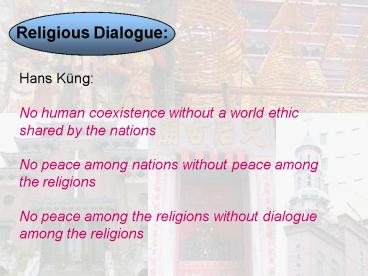Religious Dialogue: - PowerPoint PPT Presentation
1 / 21
Title: Religious Dialogue:
1
Religious Dialogue
Hans Küng No human coexistence without a world
ethic shared by the nations No peace among
nations without peace among the religions No
peace among the religions without dialogue among
the religions
2
One all-encompassing religion Akbar, Mongul
emperor (1542-1605) joined together the
Jewish-Christian-Islamic belief in one God, Hindu
and Zoroastrian elements, to form a divine faith,
Din Ilahi In HK and Taiwan, I-kuan-tao ???,
five religions in one, combining Taoism,
Buddhism, Confucianism, Islam and Christianity
3
Theology of Universal Salvation
Martin Kampchen, a Catholic theologian living in
India Up till now theology has taken as its
point of departure a mock pluralism. It says that
everything good and true found in other religions
is actually to be ascribed to Christianity in
other words, that a Hindu, insofar as he lives a
morally pure life and truly seeks God is an
anonymous Christian
4
Fourth Lateran Council (1215) Outside the
Church there is no salvation.
Second Vatican Council of Catholic Church (1965)
Gods saving will also embraces those who
acknowledge the Creator, and among them
especially the Muslims, who profess the faith of
Abraham and together with us adore the one God,
the Merciful One, who will judge them on the Last
Day.
5
Second Vatican Council of Catholic Church
(1966) in Hinduism men contemplate the divine
mystery and express it through an inexhaustible
abundance of myths and through searching
philosophical inquiry. They seek freedom from the
anguish of our human condition either through
ascetical practices or profound meditation or a
flight to God with love and trust.
6
- Projection Theory of Ludwig Feuerbach Church
Father of modern atheism - the consciousness of the infinite is nothing
else than the consciousness of the infinity of
the consciousness i.e. - Man projects his human nature out of himself
into GOD. - Secret of religion is not only Atheism, but
Anthropotheism God (the pseudo nature of
religion) is not simply to be denied, but the
real nature of man (the true nature of religion)
is to be affirmed, extolled, loved. - illustrates the path of comprehending God
- But asserts that the non-existence of the
infinite - independent of our consciousness
- wish ? wishful thinking
7
Opium Theory of Karl Marx religion is the
opium OF the people
- Religious distress is at the same time the
expression of real distress and also protest
against the real distress. Religion is the sigh
of the oppressed creature - it is illusionary happiness
8
Lenin religion is the opium FOR the people.
- Religion is opium for the people. Religion
is a kind of spiritual intoxicant, in which the
slaves of capital drown their humanity, and blunt
their desire for decent human existence. - Politically manipulative
9
Father-complex Theory of Sigmund Freud
- psychoanalysis has made us familiar with the
intimate connection between the father-complex
and belief in God it has shown us that a
personal God is, psychologically, nothing other
than an exalted father. - i.e. longing for a father is the root of
religious needs.
10
Secularization thesis
- religious thinking, practices and institutions
are losing social significance. - Ludwig Feuerbach
- religion has long vanished
- Karl Marx
- religion is withering away
11
Secularization
- rationalization leading to disenchantment of the
world - Max Weber Modernity was an iron cage a
world once charged with religious
significance had been disenchanted - b) differentiation (division of labour
specialization of function) religions fulfill
fewer and fewer social functions - c) migration, urbanization and improved
communication destabilize settled communities and
the constituting religion - d) pluralization makes once taken-for-granted
beliefs increasingly implausible
12
- YES
- formal traditional religious organizations
decline - BUT de-secularization (Peter Berger) and
sacralization - e.g. resurgence of Islam, Charismatic
Protestantism (in Latin America), revitalization
in various religions, dramatic increase in China
and Russia
13
- YES
- functions of religions decrease ?
differentiation - Now, public world is not built up by shared
worldview, i.e. values, morality, identities - YET as the world is disenchanted, one goes to
own subjectivities
14
- NO
- disappearance thesis is not supported Only
privatization and specialization thesis - Before Belonging without believing
- Now Believing without belonging
- Before public and all-embracing functions
- Now private and essential functions
15
- NO
- secularization vs secularism
- Objectively growing worldliness of the world and
religious institutions - Vs ideology that one should go to atheism
16
- NO
- scientism all reality, including religions, is
scientifically explicable
religious beliefs
Scientific thought
BUT Parapsychology (PSI) study of psychic
phenomenon
17
- NO
- spirituality vs religion
- NO
- universalization of heresy, heretic means to
- choose in ancient Greek we are all heretics
- NO
- New Religious Movements e.g. Soka Gakkai
- was founded in 1930 (see next lecture and
- corresponding visit)
18
Who believes in religions?
Deprivation/Compensation theory religions
provide people with the means to cope with the
psychological and physical strain of
disadvantaged social and economic status
19
NO nomization, that is, human need of giving
order to the chaotic reality without order,
anomie ? suicide NOT ONLY sacred vs profane BUT
ALSO sacred vs chaos Medias blessing to Anita
Muis after-life marginal situation (like
SARS) arouses deep anxiety
20
Believing without belonging Absence of
constant religious affiliation and identification
with particular religious institutions or
ideologies. Bruce the promotion of the inner
realm is taken to the extent of denying all
external authority. Particular teachers might be
useful, but the final arbiter not only of what is
right, but also of what is true, is the
individual.
21
Hanegraaff for the very first time in
history, spiritualities are detaching themselves
entirely from specific existing religions and are
starting to lead their own lives within the
context of a non-religious society.































